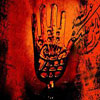
Al-Husayn (‘a) stood to perform his prayers. It is said that he led the prayers' service before the survivors from among his companions. It was a special prayer called Salat al-khawf, the prayer said by one fearing for his life. In front of him stood Zuhayr Ibn al-Qayn and Sa'id Ibn ‘Abdullah al-Hanafi and half of the surviving companions.36
Other historians say that he and his companions offered their prayers individually.37
Far away it was from being a prayer in fear,
For it was not of death frightened,
Though death was from it quite near.
But the bloody stand did not cause it to bend,
Nor did the army stop it from near or from far.
It charged, though thirsty,
And the sun was burning,
From it the ground was as though on fire.
It shook the hosts so it was as though
Al-Taff's plains and valleys were not vast at all.
Ask the battlefield about it and you will see
How it stamped it with stabs and with blows,
How it defended Allah's every sanctity
So it did not harm any glory at all
Nor did it in fear flee.
How it defended Allah's creed,
The guided ones were few.
Their enemies filled the place
They had arrows and swords but no grace,
About them wrote history:
Their mischief filled the valley.38
When Sa'id's wounds became overwhelming, he fell on the ground as he was supplicating thus: "O Allah! Curse them as You cursed the peoples of ‘Ad and Thamud and convey my Salam to Your Prophet (S) and tell him about the pain of the wounds which I have received, for I desired Your rewards when I supported the offspring of Your Prophet, Peace of Allah be upon him and his progeny."39
He turned to Imam al-Husayn (‘a) and asked him, "Have I carried out my obligation, O son of the Messenger of Allah?" "Yes," said the Imam (‘a), "and you shall reach Paradise before I do."40 Then the hero died.
As many as thirteen arrows were found planted in his body in addition to the blows which he had sustained from swords and lances.41
Having finished his prayers, al-Husayn (‘a) addressed his companions thus:
O honourable men! Here is Paradise with its gates wide open for you, with its rivers joining one another, with its fruits ripened, and here is the Messenger of Allah and the martyrs who were killed in the Cause of Allah: they all are waiting for you to join them. They are congratulating one another on your account; so do defend the religion of Allah and of His Prophet (S), and do protect the women of the Messenger of Allah (S).
They all said to him, "May our lives be sacrificed for yours, and may our blood protect yours! By Allah! So long as blood flows in our veins, no harm shall reach you or your ladies."42
Notes:
36. 'Abdullah Nur-Allah al-Bahrani, Maqtal al-'Awalim, p. 88. al-Khawarizmi, Maqtal al-Husayn, Vol. 2, p. 17. In my view, al-Husayn's prayer was performed as qasr because he had arrived at Karbala' on the second of Muharram. Due to the knowledge which he had received from his grandfather, the Messenger of Allah (S), in addition to his knowledge that he was going to be killed on the tenth of Muharram, he could not intend to stay there for ten days or more. Those who are not familiar with all of this presumed that he had performed salat al-khawf (prayer of one who fears for his life).
37. Ibn Nama, Muthir al-Ahzan, p. 44.
38. This poem was composed by the authority Sayyid Muhammad son of Ayatullah Sayyid Jamal Gulpaygani.
39. 'Abdullah Nur-Allah al-Bahrani, Maqtal al-'Awalim, p. 88.
40. Thakhirat al-Darayn, p. 178.
41. Ibn Nama, Al-Luhuf, p. 62.
42. Sayyid Kaďim al-Ha'iri, Asrar al-Shahada, p. 175.
Adapted from: "Maqtal al-Husayn; Martyrdom Epic of Imam al-Husayn (a.s.)" by: "Abd al-Razzaq al-Muqarram"
source : www.rafed.net













